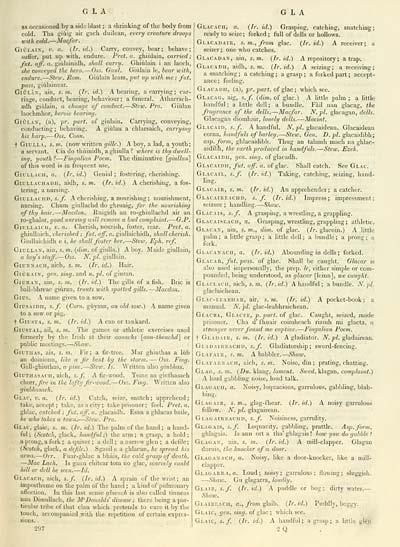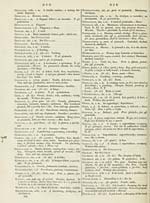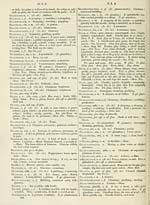Download files
Complete book:
Individual page:
Thumbnail gallery: Grid view | List view

G L A
G L A
as occasioned by a side blast ; a shrinking of the body from
cold. Tha 2;iùig air gach duilean, every creature droops
with cold. — Macfar.
GiÙLAix, V. a. {Ir. id.) Carry, convey, bear; behave;
suffer, put up with, endure. Pret. a. ghiùlain, carried ;
fut. aff. a. giiilainidh, shall carry. Ghiùlain i an laoch,
she conveyed the hero. — On. Gaul. Giùlain le, bear with,
endure. — Stew. Rom. Giùlain learn, put up icith me; fut.
pass, giùlainear.
GiOlAx, ain, s. m. (/r. id.) A bearing, a carrying ; car-
riage, conduct, bearing, behaviour; a funeral. Atharrach-
adh giiilain, a change of conduct. — Stew. Pro. Giùlan
laochmhor, heroic bearing.
GiÙLAN, (a), pr. part, of giulain. Carrying, conveying,
conducting ; behaving. A giùlan a chlarsaich, carrying
his harp. — Oss. Conn.
t GiiLL.i, s. m. (now written gille.) A boy, a lad, a youth;
a servant. Cia do thùinidh, aghiulla? where is thy divell-
ing, youth ? — Fingalian Poem. The diminutive \(jiullan\
of this word is in frequent use.
GiVLLACii, a. (Jr. id.) Genial; fostering, cherishing.
GiuLLACHADH, aidh, s. m. {Ir. id.) A cherishing, a fos-
tering, a nursing.
GiuLLACiiD, s.y". A cherishing, a nourishing; nourishment,
nursing. Chum giullachd do ghruaig, for the nourishing
of thy hair. — Macdon. Ruigidh an ro-ghiullachd air an
ro-ghalar, good nursing will remove a bad complaint. — G.P.
GiuLLAiCH, V. a. Cherish, nourish, foster, rear. Pret. a.
ghiullaich, cherished ; fut. ajf. a. giullaichidh, shall cherish.
Giullaichidh e i, he shall foster her. — Stew. Eph. ref
GiuLLAX, ain, s. m. (dim. of giulla.) A boy. Maide giullain,
a boy's staff. — Oss. N. pi. giullain.
GiuNXACH, aich, s. m. {Ir. id.) Hair.
GiiiRAix, gen. sing, and n. pi. of giuran.
GiURAX, ain, s. ?«. {Ir. id.) The gills of a fish. Brie is
ball-bhreac giuran, trouts with spotted gills. — Macdon.
Gius. A name given to a sow.
GiusAiDit, s.f. {Corn, gùysan, an old sow.) A name given
to a sow or pig.
t GiusTA, s. m. {Ir. id.) A can or tankard.
GiusTAL, ail, s. m. The games or athletic exercises used
formerly by the Irish at their aonachs [aon-theachd] or
public meetings. — Shatc.
GiUTiiAS, ais, s. m. Fir; a fir-tree. Mar ghiuthas a lùb
an doinionn, like a fir bent by the storm. — Oss. Fing.
Gall-ghiuthas, a pine. — Stew. Is. Written also giubhas.
GiuTHASACii, aich, s.f. A fir-wood. Teine an giuthasach
choTT,fre in the lofty fr-wood. — Oss. Fing. Written also
giubhasach.
Glac, v. a. {Ir. id.) Catch, seize, snatch; apprehend;
take, accept; take, as a city ; take prisoner; feel. Pret. a.
ghlac, catched ; fut. aff. a. glacaidh. Esan a ghlacas baile,
he who takes a town. — Steiv. Pro.
Glac, glaic, s. m. {Ir. id.) The palm of the hand; a hand-
ful ; {Scotch, glack, handful ;) the arm ; a grasp, a hold ;
a prong, a fork ; a quiver ; a dell ; a narrow glen ; a defile ;
(Scotch, glack, a defile.) .Sgaoil e a ghlacan, he spread his
arms. — Orr. Fuar-ghlac a bhàis, the cold grasp of death.
— Mac Lach. Is gann chitear torn no glac, scarcely could
hill or dell be seen. — Id.
Glacacii, aich, s.f. {Ir. id.) A sprain of the wrist; an
imposthume on the palm of the hand ; a kind of pulmonary
affection. In this last sense glacach is also called tinneas
nan Dònuilach, tìie M' Donalds' disease ; there being a par-
ticular tribe of that clan which pretends to cure it by the
touch, accompanied with the repetition of certain expres-
sions.
297
Glacach, a. (Ir. id.) Grasping, catching, snatching;
ready to seize; forked ; full of dells or hollows.
Glacadair, s. m., from glac. (Ir. id.) A receiver; a
seizer ; one who catches.
Glacadax, ain, s.m. {Ir. id.) A repository; a trap.
Glacadh, aidh, s. ?«. {Ir. id.) A seizing; a receiving;
a snatching; a catching; a grasp ; a forked part; accept-
ance; feeling.
Glacadh, (a), pr. part, of glac; which see.
Glacag, aig, s.f. (dim. of glac.) A little palm ; a little
handful ; a little dell ; a bundle. Fail nan glacag, the
fragrance of the dells. — Macfar. N. pi. glacagan,"&/?«.
Glacagan diomhair, lonely dells. — Macint.
Glacaid, s.f. A handful. iV. pZ. glacaidean. Glacaidean
eorna, handfuls of barley. — Steiv. Gen. D. pi. glacaidibh;
asp. form, ghlacaidibh. Thug an talamh mach na ghlac-
aidibh, the earth produced in handfuls. — Stew. Ezek.
Glacaidh, gen. sing, of glacadh.
Glacaidh, /a^ n^. a. of glac. Shall catch. See Glac.
Glacail, s.f. {Ir. id.) Taking, catching, seizing, hand-
ling.
Glacair, s.m. {Ir. id.) An apprehender; a catcher.
Glacaireachd, s.f. {Ir. id.) Impress; impressment;
seizure ; handling. — Shaw.
Glacais, s.f. A grasping, a wrestling, a grappling.
Glacaiseach, a. Grasping, wrestling, grappling; athletic.
Glacax, ain, s. m., dim. of glac. {Ir. glacoin.) A little
palm ; a little grasp ; a little dell ; a bundle ; a prong ; a
fork.
Glacanach, a. {Ir. id.) Abounding in dells ; forked.
Glacar, fut. pass, of glac. Shall be caught. Glacar is
also used impersonally, the prep, le, either simple or com-
pounded, being understood, as glacar [leinn], we caught.
Glaclacii, aich, s. m. {Ir.id.) A handful ; a bundle. N.pl.
glaclaichean.
Glac-leabiiar, air, s.m. (Ir. id.) A pocket-book; a
manual. N. pi. glac-leabhraichean.
Glacpa, Glacte, p. part, of glac. Caught, seized, made
prisoner. Cha d' fhuair coimheach riamh mi glacta, a
stranger never found me captive. — Fingalian Poem.
t Gladair, s.m. (Ir.id.) A gladiator. iV. p/. gladairean.
Gladaireachd, s.f. Gladiatorship ; sword-fencing.
Glaiair, s. m. A babbler. — Shaw.
Glafarnach, aich, s.m. Noise, din ; prating, chatting.
Glag, s.m. (Du. kla&g, lament. Swed. k\Agan, complaint.)
A loud gabbling noise, loud talk.
Glagach, a. Noisy, loquacious, garrulous, gabbling, blab-
bing.
Glagair, s. m., glag-fhear. {Ir. id.) A noisy garrulous
fellow. iV. pi. glagairean.
Glagaireachd, s.f. Noisiness, garrulity.
Glag AIS, s.f. Loquacity, gabbling, prattle. Asp. form,
ghlagais. Is ann ort a tha' ghlagais ! how you do gabble !
Glagax, ain, s. m. (Ir. id.) A mill-clapper. Glagan
doruis, tlie knocker of a door.
Glaganach, a. Noisy, like a door-knocker, like a mill-
clapper.
Glagarra,o. Loud; noisy; garrulous; flowing; sluggish.
— Shaw. Gu glagarra, loudly.
Glaib, s.f. {Ir. id.) A puddle or bog; dirty water. —
Shaiv.
Glaibeacii, a., from glaib. (/;•. id.) Puddlv, bcggv.
Glaic, gen. sing, of glac ; which see.
Glaic, s.f. (Ir. id.) A handful; a grasp; a little glen
2Q
G L A
as occasioned by a side blast ; a shrinking of the body from
cold. Tha 2;iùig air gach duilean, every creature droops
with cold. — Macfar.
GiÙLAix, V. a. {Ir. id.) Carry, convey, bear; behave;
suffer, put up with, endure. Pret. a. ghiùlain, carried ;
fut. aff. a. giiilainidh, shall carry. Ghiùlain i an laoch,
she conveyed the hero. — On. Gaul. Giùlain le, bear with,
endure. — Stew. Rom. Giùlain learn, put up icith me; fut.
pass, giùlainear.
GiOlAx, ain, s. m. (/r. id.) A bearing, a carrying ; car-
riage, conduct, bearing, behaviour; a funeral. Atharrach-
adh giiilain, a change of conduct. — Stew. Pro. Giùlan
laochmhor, heroic bearing.
GiÙLAN, (a), pr. part, of giulain. Carrying, conveying,
conducting ; behaving. A giùlan a chlarsaich, carrying
his harp. — Oss. Conn.
t GiiLL.i, s. m. (now written gille.) A boy, a lad, a youth;
a servant. Cia do thùinidh, aghiulla? where is thy divell-
ing, youth ? — Fingalian Poem. The diminutive \(jiullan\
of this word is in frequent use.
GiVLLACii, a. (Jr. id.) Genial; fostering, cherishing.
GiuLLACHADH, aidh, s. m. {Ir. id.) A cherishing, a fos-
tering, a nursing.
GiuLLACiiD, s.y". A cherishing, a nourishing; nourishment,
nursing. Chum giullachd do ghruaig, for the nourishing
of thy hair. — Macdon. Ruigidh an ro-ghiullachd air an
ro-ghalar, good nursing will remove a bad complaint. — G.P.
GiuLLAiCH, V. a. Cherish, nourish, foster, rear. Pret. a.
ghiullaich, cherished ; fut. ajf. a. giullaichidh, shall cherish.
Giullaichidh e i, he shall foster her. — Stew. Eph. ref
GiuLLAX, ain, s. m. (dim. of giulla.) A boy. Maide giullain,
a boy's staff. — Oss. N. pi. giullain.
GiuNXACH, aich, s. m. {Ir. id.) Hair.
GiiiRAix, gen. sing, and n. pi. of giuran.
GiURAX, ain, s. ?«. {Ir. id.) The gills of a fish. Brie is
ball-bhreac giuran, trouts with spotted gills. — Macdon.
Gius. A name given to a sow.
GiusAiDit, s.f. {Corn, gùysan, an old sow.) A name given
to a sow or pig.
t GiusTA, s. m. {Ir. id.) A can or tankard.
GiusTAL, ail, s. m. The games or athletic exercises used
formerly by the Irish at their aonachs [aon-theachd] or
public meetings. — Shatc.
GiUTiiAS, ais, s. m. Fir; a fir-tree. Mar ghiuthas a lùb
an doinionn, like a fir bent by the storm. — Oss. Fing.
Gall-ghiuthas, a pine. — Stew. Is. Written also giubhas.
GiuTHASACii, aich, s.f. A fir-wood. Teine an giuthasach
choTT,fre in the lofty fr-wood. — Oss. Fing. Written also
giubhasach.
Glac, v. a. {Ir. id.) Catch, seize, snatch; apprehend;
take, accept; take, as a city ; take prisoner; feel. Pret. a.
ghlac, catched ; fut. aff. a. glacaidh. Esan a ghlacas baile,
he who takes a town. — Steiv. Pro.
Glac, glaic, s. m. {Ir. id.) The palm of the hand; a hand-
ful ; {Scotch, glack, handful ;) the arm ; a grasp, a hold ;
a prong, a fork ; a quiver ; a dell ; a narrow glen ; a defile ;
(Scotch, glack, a defile.) .Sgaoil e a ghlacan, he spread his
arms. — Orr. Fuar-ghlac a bhàis, the cold grasp of death.
— Mac Lach. Is gann chitear torn no glac, scarcely could
hill or dell be seen. — Id.
Glacacii, aich, s.f. {Ir. id.) A sprain of the wrist; an
imposthume on the palm of the hand ; a kind of pulmonary
affection. In this last sense glacach is also called tinneas
nan Dònuilach, tìie M' Donalds' disease ; there being a par-
ticular tribe of that clan which pretends to cure it by the
touch, accompanied with the repetition of certain expres-
sions.
297
Glacach, a. (Ir. id.) Grasping, catching, snatching;
ready to seize; forked ; full of dells or hollows.
Glacadair, s. m., from glac. (Ir. id.) A receiver; a
seizer ; one who catches.
Glacadax, ain, s.m. {Ir. id.) A repository; a trap.
Glacadh, aidh, s. ?«. {Ir. id.) A seizing; a receiving;
a snatching; a catching; a grasp ; a forked part; accept-
ance; feeling.
Glacadh, (a), pr. part, of glac; which see.
Glacag, aig, s.f. (dim. of glac.) A little palm ; a little
handful ; a little dell ; a bundle. Fail nan glacag, the
fragrance of the dells. — Macfar. N. pi. glacagan,"&/?«.
Glacagan diomhair, lonely dells. — Macint.
Glacaid, s.f. A handful. iV. pZ. glacaidean. Glacaidean
eorna, handfuls of barley. — Steiv. Gen. D. pi. glacaidibh;
asp. form, ghlacaidibh. Thug an talamh mach na ghlac-
aidibh, the earth produced in handfuls. — Stew. Ezek.
Glacaidh, gen. sing, of glacadh.
Glacaidh, /a^ n^. a. of glac. Shall catch. See Glac.
Glacail, s.f. {Ir. id.) Taking, catching, seizing, hand-
ling.
Glacair, s.m. {Ir. id.) An apprehender; a catcher.
Glacaireachd, s.f. {Ir. id.) Impress; impressment;
seizure ; handling. — Shaw.
Glacais, s.f. A grasping, a wrestling, a grappling.
Glacaiseach, a. Grasping, wrestling, grappling; athletic.
Glacax, ain, s. m., dim. of glac. {Ir. glacoin.) A little
palm ; a little grasp ; a little dell ; a bundle ; a prong ; a
fork.
Glacanach, a. {Ir. id.) Abounding in dells ; forked.
Glacar, fut. pass, of glac. Shall be caught. Glacar is
also used impersonally, the prep, le, either simple or com-
pounded, being understood, as glacar [leinn], we caught.
Glaclacii, aich, s. m. {Ir.id.) A handful ; a bundle. N.pl.
glaclaichean.
Glac-leabiiar, air, s.m. (Ir. id.) A pocket-book; a
manual. N. pi. glac-leabhraichean.
Glacpa, Glacte, p. part, of glac. Caught, seized, made
prisoner. Cha d' fhuair coimheach riamh mi glacta, a
stranger never found me captive. — Fingalian Poem.
t Gladair, s.m. (Ir.id.) A gladiator. iV. p/. gladairean.
Gladaireachd, s.f. Gladiatorship ; sword-fencing.
Glaiair, s. m. A babbler. — Shaw.
Glafarnach, aich, s.m. Noise, din ; prating, chatting.
Glag, s.m. (Du. kla&g, lament. Swed. k\Agan, complaint.)
A loud gabbling noise, loud talk.
Glagach, a. Noisy, loquacious, garrulous, gabbling, blab-
bing.
Glagair, s. m., glag-fhear. {Ir. id.) A noisy garrulous
fellow. iV. pi. glagairean.
Glagaireachd, s.f. Noisiness, garrulity.
Glag AIS, s.f. Loquacity, gabbling, prattle. Asp. form,
ghlagais. Is ann ort a tha' ghlagais ! how you do gabble !
Glagax, ain, s. m. (Ir. id.) A mill-clapper. Glagan
doruis, tlie knocker of a door.
Glaganach, a. Noisy, like a door-knocker, like a mill-
clapper.
Glagarra,o. Loud; noisy; garrulous; flowing; sluggish.
— Shaw. Gu glagarra, loudly.
Glaib, s.f. {Ir. id.) A puddle or bog; dirty water. —
Shaiv.
Glaibeacii, a., from glaib. (/;•. id.) Puddlv, bcggv.
Glaic, gen. sing, of glac ; which see.
Glaic, s.f. (Ir. id.) A handful; a grasp; a little glen
2Q
Set display mode to: Large image | Transcription
Images and transcriptions on this page, including medium image downloads, may be used under the Creative Commons Attribution 4.0 International Licence unless otherwise stated. ![]()
| Early Gaelic Book Collections > J. F. Campbell Collection > Gaelic dictionary, in two parts > (387) |
|---|
| Permanent URL | https://digital.nls.uk/79302718 |
|---|
| Description | Volumes from a collection of 610 books rich in Highland folklore, Ossianic literature and other Celtic subjects. Many of the books annotated by John Francis Campbell of Islay, who assembled the collection. |
|---|
| Description | Selected items from five 'Special and Named Printed Collections'. Includes books in Gaelic and other Celtic languages, works about the Gaels, their languages, literature, culture and history. |
|---|

